2025
IPTV playlists have revolutionized how we access television content, offering an alternative to traditional cable subscriptions. These specialized files allow users to stream thousands of live TV channels and on-demand content through various devices. Whether you’re new to IPTV or looking to optimize your streaming experience, this comprehensive guide covers everything you need to know about IPTV playlists.
From understanding the technical aspects of M3U files to navigating legal considerations and troubleshooting common issues, we’ll walk you through the essentials of using IPTV playlists effectively and responsibly in 2025.
How IPTV Playlists Work
IPTV playlist structure in M3U format showing channel entries
IPTV playlists are essentially text files that contain a collection of URLs pointing to streaming sources for various TV channels and on-demand content. These files use the M3U (MP3 URL) format, which was originally developed for audio playlists but has since become the standard for organizing streaming media links.
Technical Overview of M3U Format
The M3U file format serves as a container that organizes streaming links in a structured way that media players can interpret. These files typically have the extension .m3u or .m3u8 (for UTF-8 encoded files). Each entry in an IPTV playlist contains:
- Channel name or title
- Stream URL (the actual link to the media content)
- Optional metadata like channel logos, groups, and EPG (Electronic Program Guide) IDs
Many IPTV playlists also integrate with EPG services, which provide program schedules and information about what’s currently playing on each channel. This integration enhances the viewing experience by offering a TV guide similar to what you’d find with traditional cable services.
Supported Devices and Players
One of the major advantages of IPTV playlists is their compatibility with a wide range of devices and media players:
Smart TVs
Samsung, LG, Sony, and other smart TV brands can run IPTV apps that support playlist files
Media Players
VLC, Kodi, MPlayer, and other open-source media players support M3U playlists directly
Streaming Devices
Amazon Fire TV, Android TV boxes, Apple TV, and Roku (with appropriate apps)
Specialized IPTV applications like IPTV Smarters Pro, TiviMate, and GSE Smart IPTV offer enhanced features specifically designed for managing and playing IPTV playlists, including channel organization, favorites, and EPG integration.
Legal Considerations for IPTV Playlists
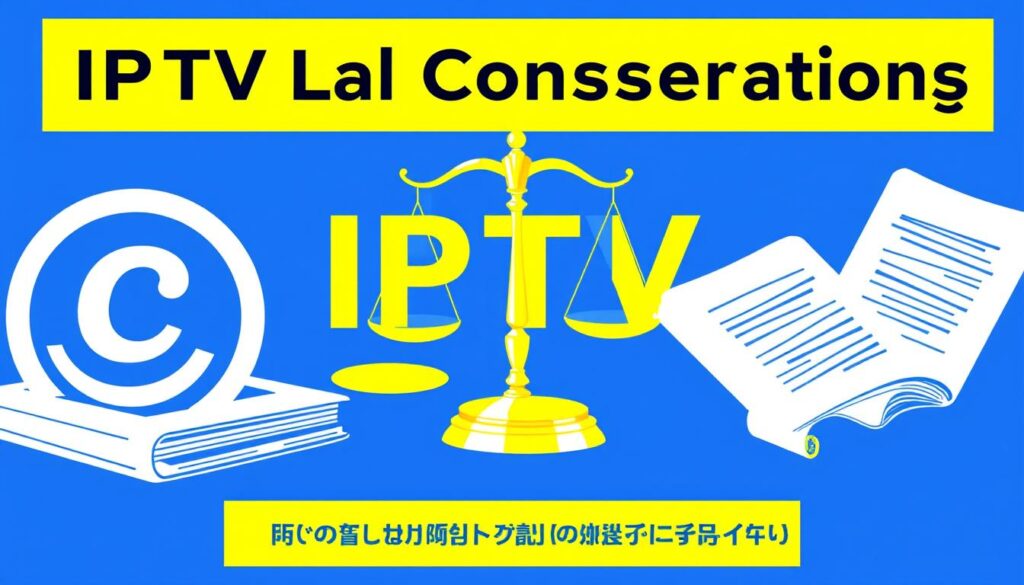
Understanding the legal landscape surrounding IPTV playlists is crucial for anyone using this technology. While the technology itself is perfectly legal, the content accessed through these playlists may not always be.
Important: This article is provided for educational purposes only. Users are responsible for ensuring they comply with copyright laws and regulations in their jurisdiction.
Copyright Risks of Unverified IPTV Playlists
Many freely available IPTV playlists found online contain links to unauthorized streams of copyrighted content. Using these playlists may expose you to legal risks, including:
Potential Legal Risks
- Copyright infringement claims
- ISP monitoring and potential service limitations
- Exposure to malware through unverified sources
- Data privacy concerns with unauthorized providers
Legal IPTV Sources
- Official broadcaster apps and websites
- Licensed IPTV service providers
- Free-to-air channels available via public playlists
- Legal streaming platforms that offer M3U export
Official Providers vs. Pirated Content
The IPTV landscape includes both legitimate services and unauthorized sources:
| Characteristic | Official IPTV Providers | Unauthorized Sources |
| Legal Status | Licensed to distribute content | Distributing content without rights |
| Cost | Subscription fee or ad-supported | Often free or suspiciously cheap |
| Reliability | Stable streams, regular updates | Frequent downtime, broken links |
| Support | Customer service available | Limited or no support |
Protect Your Privacy While Streaming
When using IPTV services, your streaming activity may be visible to your ISP and other third parties. A reliable VPN service encrypts your connection and masks your IP address, providing essential privacy protection.
How to Create and Use an IPTV Playlist
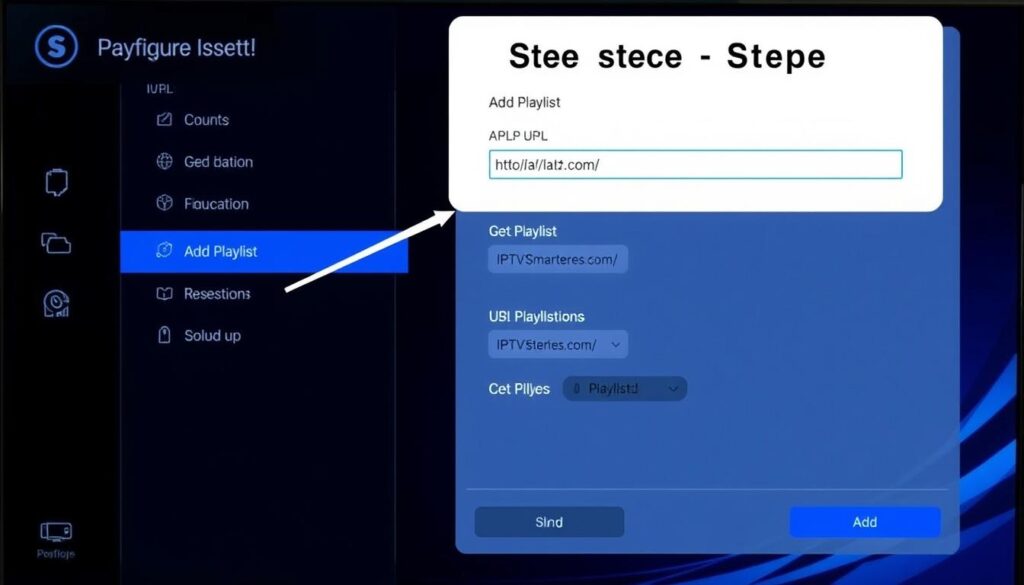
Setting up an IPTV playlist is relatively straightforward once you understand the basics. Whether you’re creating your own playlist or using one from a provider, the process follows similar steps.
Step-by-Step Setup Guide
- Choose an IPTV Player – Select a compatible application like IPTV Smarters Pro, TiviMate, or VLC Media Player based on your device.
- Install the Application – Download and install your chosen player from the appropriate app store or website.
- Obtain a Playlist URL or File – Get an M3U playlist URL from your provider or create your own.
- Add the Playlist to Your Player – Open your IPTV player and navigate to the “Add Playlist” or similar option.
- Enter Playlist Details – Input the M3U URL or select the local file, and add a name for your playlist.
- Configure EPG (Optional) – If you have an EPG URL, add it to enhance your viewing experience with program information.
- Organize Channels (Optional) – Many players allow you to create favorites or custom groups for better organization.
Recommended IPTV Player Apps
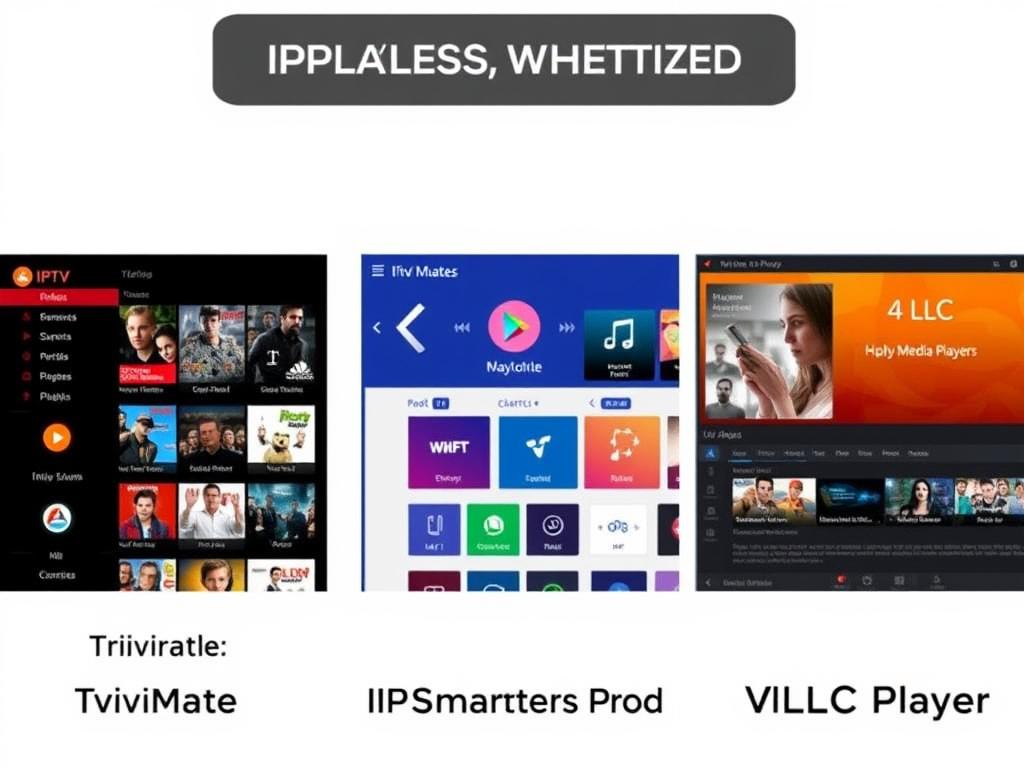
IPTV Smarters Pro
Best Overall
- User-friendly interface
- Multi-screen support
- EPG integration
- Catch-up TV support
TiviMate
Best Interface
- Premium UI experience
- Advanced channel organization
- Recording capabilities
- Multi-playlist support
VLC Media Player
Most Versatile
- Cross-platform compatibility
- Open-source software
- Supports multiple formats
- No ads or purchases
Creating Your Own IPTV Playlist
If you want to create a custom playlist with your preferred channels, you can do so by following these steps:
- Open a text editor (Notepad, TextEdit, etc.)
- Start the file with
#EXTM3Uon the first line - For each channel, add:
#EXTINF:-1 tvg-name="Channel Name" tvg-logo="logo_url.png" group-title="Category",Channel Name- On the next line, add the stream URL
- Save the file with a .m3u extension
- Import the file into your IPTV player
Pro Tip: When creating your own playlist, include only legal sources such as free-to-air channels, official broadcaster streams, or content you have rights to access.
Top 5 IPTV Playlist Providers (2025)
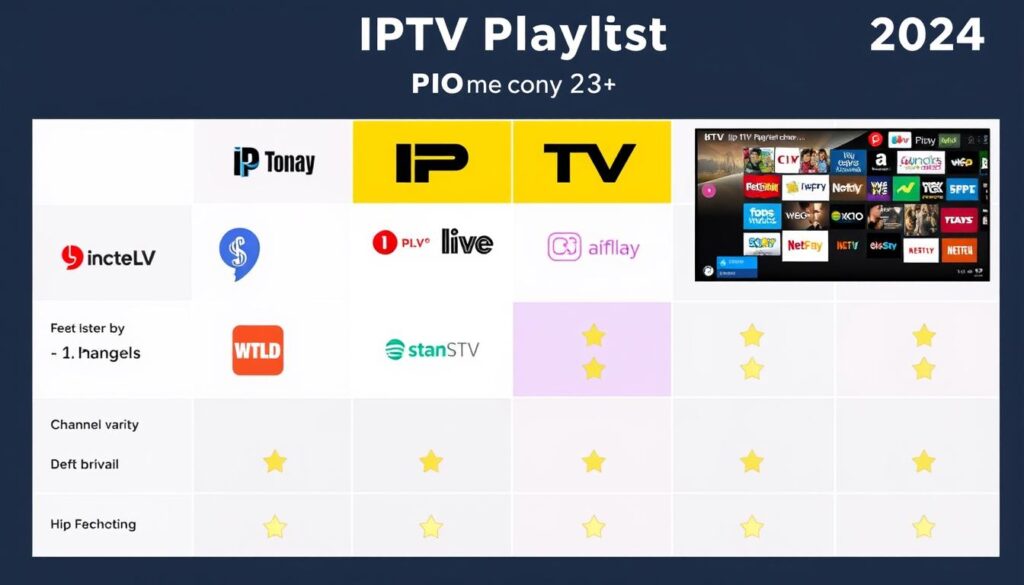
The IPTV playlist landscape includes both free and paid options. Here’s a comparison of some of the most reliable providers in 2025, focusing on legal services that offer quality content.
| Provider | Type | Channel Count | EPG Support | Best For |
| IPTV-Org | Free | 10,000+ | Yes | Variety and open-source community |
| Samsung TV Plus | Free | 1,500+ | Yes | Quality mainstream content |
| Pluto TV | Free | 250+ | Yes | Curated content and VOD |
| Xumo | Free | 350+ | Yes | News and sports content |
| Local Now | Free | 300+ | No | Local news and regional content |
Free vs. Paid IPTV Options
Free IPTV Playlists
- No subscription costs
- Wide variety of public domain content
- Community-maintained updates
- Easy to try different sources
Paid IPTV Services
- Higher reliability and uptime
- Better stream quality (HD/4K)
- Customer support available
- Regular updates and maintenance
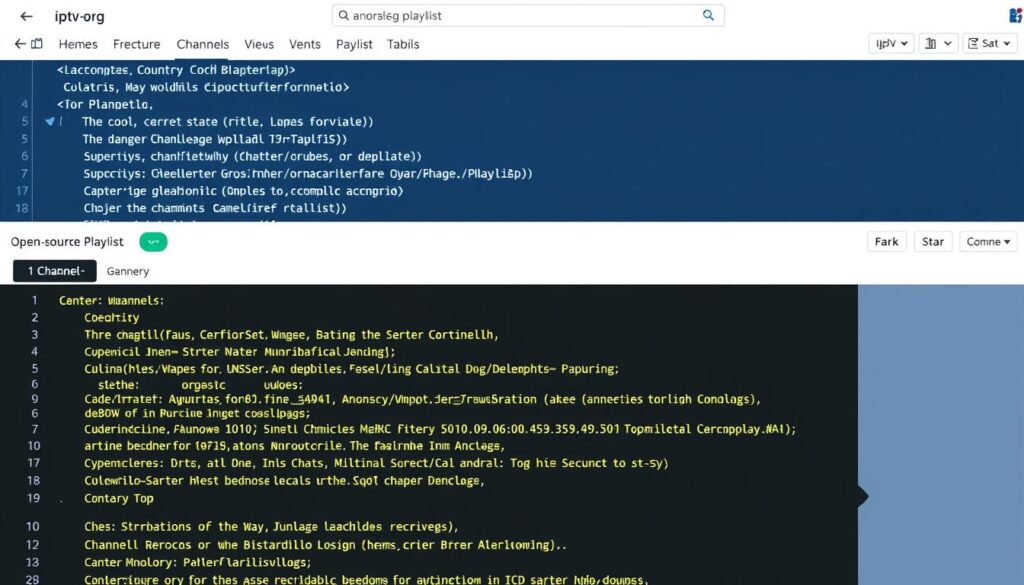
IPTV-Org: The Leading Open-Source Option
IPTV-Org stands out as one of the most comprehensive free IPTV playlist sources. This open-source project on GitHub offers thousands of channels organized by country, language, and category.
- URL: https://iptv-org.github.io/iptv/index.m3u
- GitHub Stars: 95K+ (as of 2025)
- Content: News, sports, entertainment, documentaries, and more
- Organization: Channels sorted by region and category
- Updates: Regular community contributions and maintenance
Note: While IPTV-Org aims to include only legally available streams, users should verify the legality of specific channels in their region before viewing.
Troubleshooting Common IPTV Playlist Issues
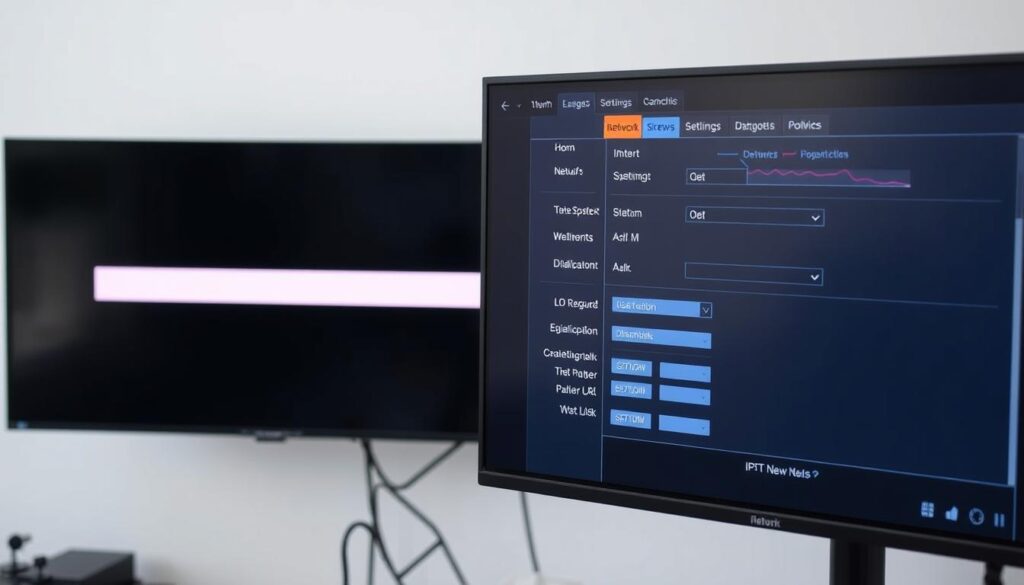
Even with the best IPTV playlists, you may encounter technical issues. Here are solutions to the most common problems users face:
Buffering and Playback Problems
Common Causes
- Insufficient internet bandwidth
- Network congestion
- Overloaded streaming servers
- Device processing limitations
Solutions
- Use a wired connection instead of Wi-Fi when possible
- Close other bandwidth-intensive applications
- Try a different server or playlist source
- Adjust video quality settings to match your connection
Eliminate Buffering with VPN Optimization
Some ISPs throttle streaming traffic, causing buffering issues. A quality VPN can bypass these restrictions and optimize your connection for smoother playback.
EPG Errors and Missing Program Information
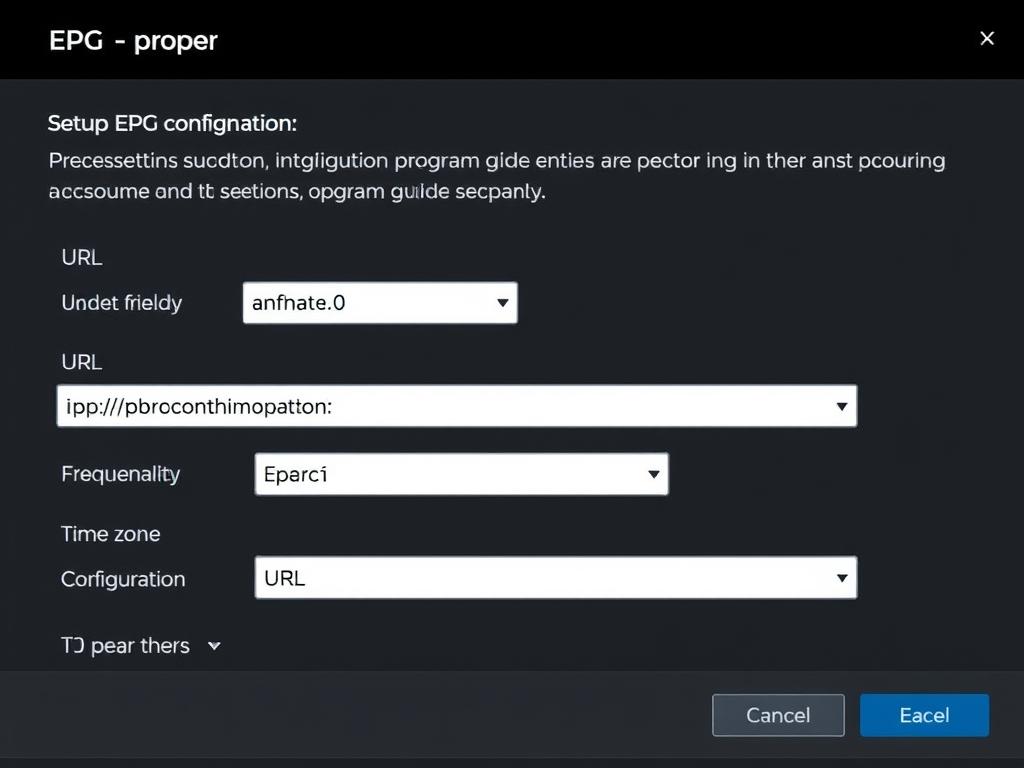
EPG (Electronic Program Guide) issues can significantly impact your viewing experience. Here’s how to address them:
- Verify EPG URL: Ensure you’re using the correct and updated EPG source URL
- Check Time Zone Settings: Incorrect time zones can cause program information misalignment
- Force EPG Refresh: Most IPTV players have an option to manually refresh EPG data
- Clear Cache: Remove old EPG data that might be causing conflicts
- Try Alternative EPG Sources: If your current EPG isn’t working, try services like xmltv.co or epg.streamstv.me
Playlist Expiration and Updates
Many IPTV playlists, especially from paid providers, expire after a certain period. Here’s how to manage this:
Signs of Expired Playlist
- All channels suddenly stop working
- “Playlist not found” errors
- Authentication failures
- Significant increase in non-working channels
Solutions
- Renew subscription if using a paid service
- Update to the latest playlist URL from your provider
- For free playlists, check for updated versions on the source website
- Set up automatic playlist updates in players that support this feature
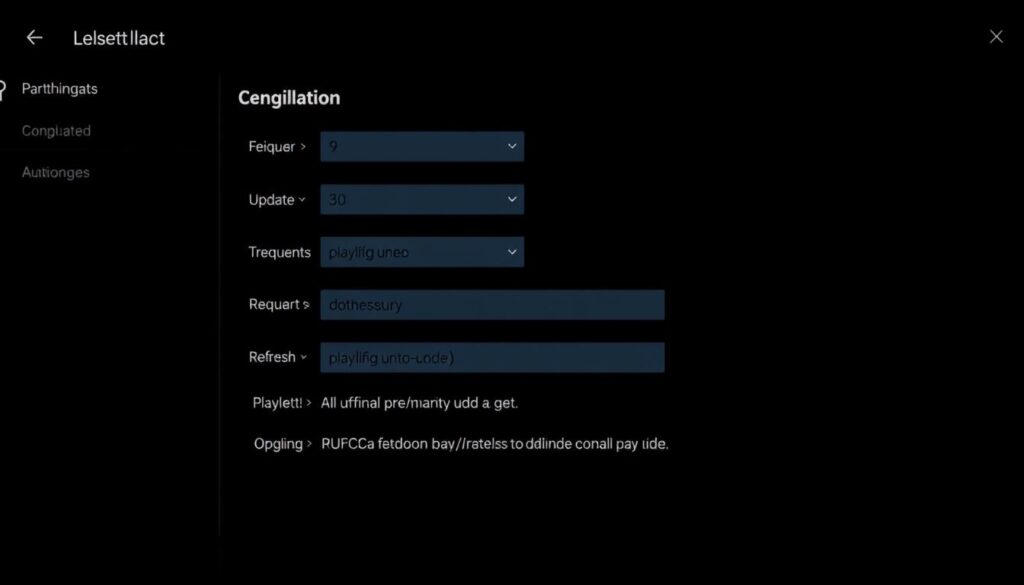
Frequently Asked Questions About IPTV Playlists
Are IPTV playlists legal to use?
The legality depends on the content source. IPTV playlists themselves are just text files with links and are not inherently illegal. However, accessing copyrighted content without proper authorization through these playlists may violate copyright laws. Legal options include free-to-air channels, official broadcaster streams, and properly licensed IPTV services.
Do I need a VPN when using IPTV playlists?
While not strictly required, using a VPN is highly recommended for several reasons:
- Protects your privacy by encrypting your streaming activity
- Prevents potential ISP throttling of streaming traffic
- Bypasses geographic restrictions on content
- Adds a layer of security when accessing various streaming sources
If you’re only using official, legal IPTV services, a VPN is less essential but still beneficial for privacy and performance reasons.
How often do IPTV playlists need to be updated?
Update frequency varies by source:
- Free public playlists: Check for updates weekly as links frequently change
- Paid services: Typically provide playlists valid for subscription duration (monthly/yearly)
- Community-maintained lists: May update daily or weekly (IPTV-Org updates regularly)
Some IPTV players support automatic playlist updates, which can simplify this process.
What’s the difference between M3U and M3U8 files?
Both are playlist formats, but with a key difference:
- M3U: The original format using the local system’s default character encoding
- M3U8: Uses UTF-8 character encoding, which supports international characters and is more universally compatible
Most modern IPTV services use M3U8 format for better international support, but both formats function similarly in compatible players.
Can I use IPTV playlists on multiple devices?
Yes, in most cases. The same M3U playlist URL or file can be used across different devices and players. However, some considerations apply:
- Paid services may limit the number of simultaneous connections
- Different players may interpret playlist formatting slightly differently
- Device capabilities affect playback quality and performance
For optimal experience, use players specifically designed for IPTV like IPTV Smarters Pro or TiviMate.
Conclusion: Making the Most of IPTV Playlists

IPTV playlists offer a flexible and powerful way to access television content across various devices. By understanding the technical aspects, legal considerations, and best practices outlined in this guide, you can create a seamless streaming experience tailored to your preferences.
Remember that the quality of your IPTV experience depends on several factors: the reliability of your playlist source, your internet connection, the capabilities of your playback device, and the IPTV player you choose. Taking time to optimize each of these elements will result in better performance and fewer interruptions.
As the streaming landscape continues to evolve, IPTV playlists remain a valuable tool for cord-cutters and media enthusiasts looking for flexible content access options. Whether you choose free community-maintained playlists or opt for premium services, the fundamentals covered in this guide will help you navigate the world of IPTV with confidence.
Stream Securely with Complete Privacy
Protect your streaming activities and access geo-restricted content with a trusted VPN service. Enjoy buffer-free playback and complete anonymity while using IPTV playlists.
